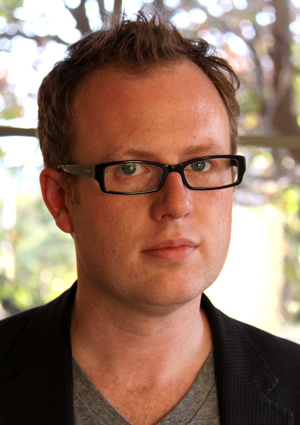Could Twitter have foreseen the tsunami that was "The Avengers" opening weekend? Fizziology uses social media to make predictions about box office success--and is doing as well or better as traditional industry predictions.

With summer movie blockbuster season upon us, it’s time for a favorite seasonal pastime: box office revenue predictions. For years, the film industry has relied on phone surveys and focus groups to project a film’s likely success. But in the age of social media, is there a new way?
Ben Carlson, the cofounder of Fizziology, thinks so. Treating Twitter, Facebook, and blogs as the world’s largest focus group, Fizziology delivers insights about a film’s buzz (or lack thereof) to big-name clients like Disney and Universal. The privately held company was profitable only after its second full year, and Carlson tells Fast Company the service has plans to roll out new products and an international service as soon as June. We spoke with Carlson to learn more about his growing company--and to find out which summer flick will be a surprisingly big winner at the box office.
FAST COMPANY: How does Fizziology work?
BEN CARLSON: Fizziology uses social media to find out what people are saying and thinking about media and entertainment.
How are you different from other “social intelligence” platforms, like Trendrr?
 We consider ourselves a research company more than a technology company. We convert our findings into actionable business intelligence. That can be, before a movie starts, helping a studio figure out what actor might be right for the film. Or, after the first trailer comes out, helping them realize what lines, characters, or themes are breaking out, so they can highlight those in later campaigns. We turn the data into something that’s not just a curiosity for the social media manager, but something executives can actually make decisions from.
We consider ourselves a research company more than a technology company. We convert our findings into actionable business intelligence. That can be, before a movie starts, helping a studio figure out what actor might be right for the film. Or, after the first trailer comes out, helping them realize what lines, characters, or themes are breaking out, so they can highlight those in later campaigns. We turn the data into something that’s not just a curiosity for the social media manager, but something executives can actually make decisions from.There’s a reason Twitter calls its massive amounts of data a “firehose.”
From a data perspective, my God, social media is tremendous. If you put people in a focus group and give that weight, why wouldn’t you put weight in the world’s biggest, fastest, most honest focus group?
Many social intelligence companies use automated sentiment analysis, which can lead to misfires, particularly when a tweet or comment is sarcastic. You do something different, though.
We do. We use “human sentiment analysis,” which is a fancy way of saying we use people, not algorithms. This is one thing my co-creator and I really believed in. Sometimes these algorithms are laughably off. You’ll read the thing rated positive, and it’s clear to any person that it’s negative. “This movie’s awesome! #sarcasm,” and it’s marked as positive. At any given point in time we have eight to fifteen analysts working long hours to score samples. They read feeds served up to them, score them negative, neutral, or mixed, and they’ll score for other things, like is this actually a meaningful tweet? If they see that a horror movie is called “sick,” that’s probably a good thing. But if it’s a comedy? “Oh my God, I will never watch that, it’s sick...” The ability to parse that difference really comes down to people.
What are some of your predictions for this summer blockbuster season?
Already “The Avengers” rewrote the book for openings. I know we’re going to have a lot of other big releases: “The Dark Knight Rises” is of course going to be a monster. One movie we see that’s really big in social media that not a lot of people are talking about in the mainstream press is “Snow White and the Huntsman.” That’s actually performing better in social media than some quote-unquote “big summer movies” like “Men in Black 3.” Teens and twenty-somethings are not talking about that movie as much, except for the fact that Justin Bieber and Lady Gaga supposedly have cameos in it.
As aliens, presumably.
That’s what they’re saying...
Last year, industry estimates pegged “Pirates of the Caribbean: On Stranger Tides,” as opening at $110 million, while you predicted just $95 million. The actual opening was $90.15 million, making you a lot closer. But since your publicist sent me that data, I assume she chose one of your big successes. How do you match up to traditional predictions overall?
Looking at what’s reported in industry trade publications against what we say, we are as or more accurate, and have been since the beginning of the year.
And in previous years?
Last year I think we were as accurate. The year before that, we didn’t have enough data in the system, so we would miss wildly. We’re definitely growing more accurate over time. The more data we accumulate, the more accurate we get, and our formula gets smarter and smarter. Sometimes we have misses, and we get more out of our misses than hits, since we get to learn something. “The Avengers” is a great example. Its opening weekend made $207 million, beating the previous biggest opening weekend of all time by 40 million. Our formula didn’t even know a movie could open that big.
What's ahead for you?
We've doubled in size every year, and we see that actually accelerating. We're going to be turning on some new products, and starting our first international work soon. We have a lot of interest from people around the world, and get more calls and emails from outside the U.S. than inside. Everyone's hungry for this kind of stuff, and really for the first time it's possible to parse social conversation not just by language, but by region. That's gonna make it infinitely more powerful.
This interview has been condensed and edited.
For more from the Fast Talk interview series, click here. Know someone who'd make a good Fast Talk subject? Mention it to David Zax.
Follow Fast Company on Twitter.
[Image: Flickr user Bob Jagendorf]
ICT4PE&D
No comments:
Post a Comment
Thank's!